
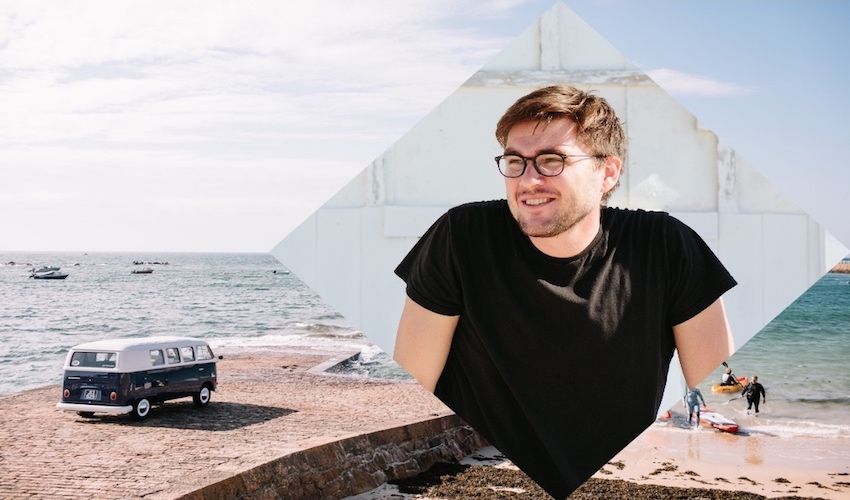

Next time you find yourself eye-rolling at the annual company ‘away-day’ itinerary, spare a thought for Florence Boot. She never meant for it to be this way.
While the oft-dreaded day out might seem an invention of our ‘can-do’ cousins, its roots actually lie in Jersey, with the St. Helier-born half of the ‘Boots the Chemists’ duo.
Lady Boot was a pioneering architect of what we’ve come to know as workforce wellbeing.
An early adopter of the, ‘a happy and healthy worker is a hard worker’ mantra, her innovations included employing welfare officers and ensuring each employee started the day with a hearty breakfast and a cup of cocoa.
She even went so far as to organise activities outside working hours, including hobby clubs, cycling, tennis, and even day-trips to the seaside.

Pictured: Constant hard work isn't always easy
But in the modern-day corporate world’s never-ending effort to boost output as efficiently and economically as possible, Lady Boot’s wholesome ethos has, in many cases, been synthesised into ‘trust falls’ and cereal packet-building contests – sitcom fodder, rather than genuine productivity drivers.
But that’s not to rule out the benefits of 21st century corporate retreats altogether.
Done right, they can be a powerful tool, as one entrepreneur harnessing the benefits of ‘vitamin sea’ explained to Express...
Ericeira is a visual exhale.
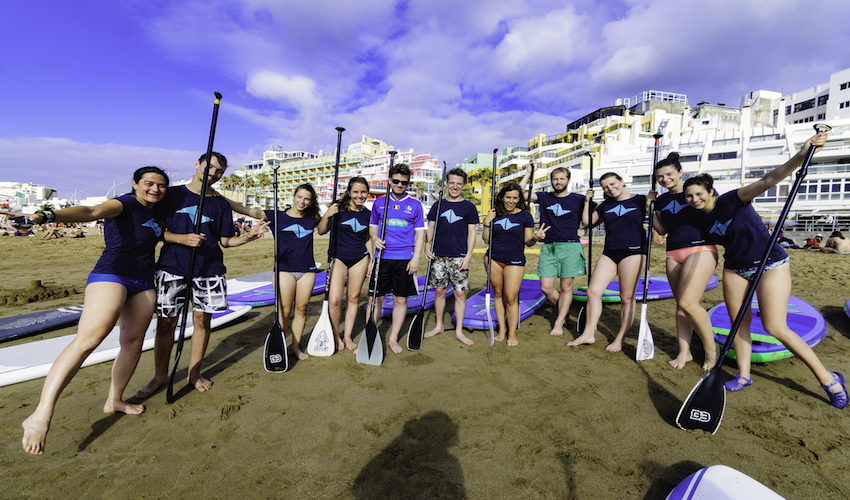
Pictured: A group of paddle boarders at one of Ericeira's beaches. (Peter Fabor/Surf Office)
Tucked away on the west coast of Portugal, the diminutive fishing village is a sanctuary of cobbled streets filled with whitewashed homes and the scents of smoked sardines and fresh pastéis de nata.
Followed to their conclusion, these narrow passages give way to one of 40 beaches, each revealing a rich Atlantic panorama, populated in summer by surfers visiting their ‘Mecca'.
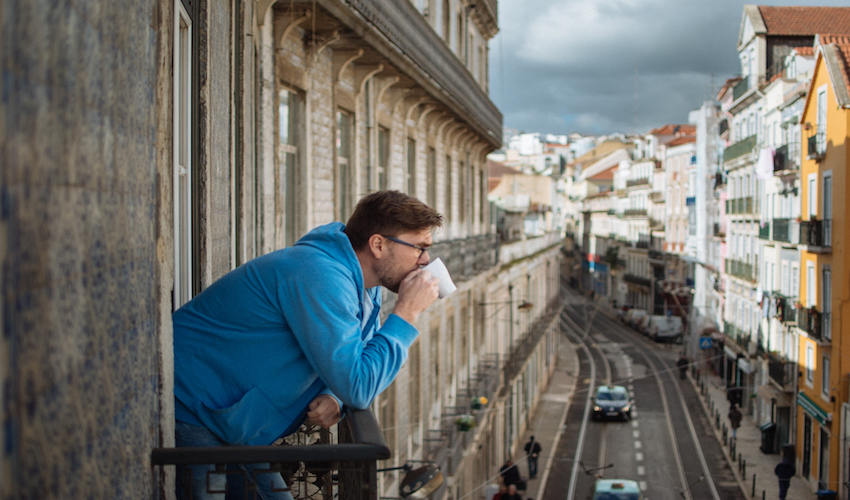
Pictured: Surf Office founder, Peter Fabor. (Peter Fabor/Surf Office)
The remote scene oozes pleasure and wholesome enjoyment – a world that couldn’t be further from spreadsheets, staplers, and endlessly ringing phones.
But, counter-intuitive though it may be, that’s exactly why the Portuguese parish is software-company-employee-turned-entrepreneur Peter Fabor’s favourite location for ‘business.’
In his eyes, the very fact it’s a pocket of serenity makes it ideal for unplugging, re-centring, and innovating.
It’s a concept he’s built an entire company on.
“One of the mottos of Surf Office is, 'Kill the routine’… I believe that when you change the environment and you kill your routine, it can bring new ideas to your life or you can explore new things,” Peter explains.
In fact, it was by killing his own routine that the now avid surfer dreamed up the blueprint for the Surf Office.
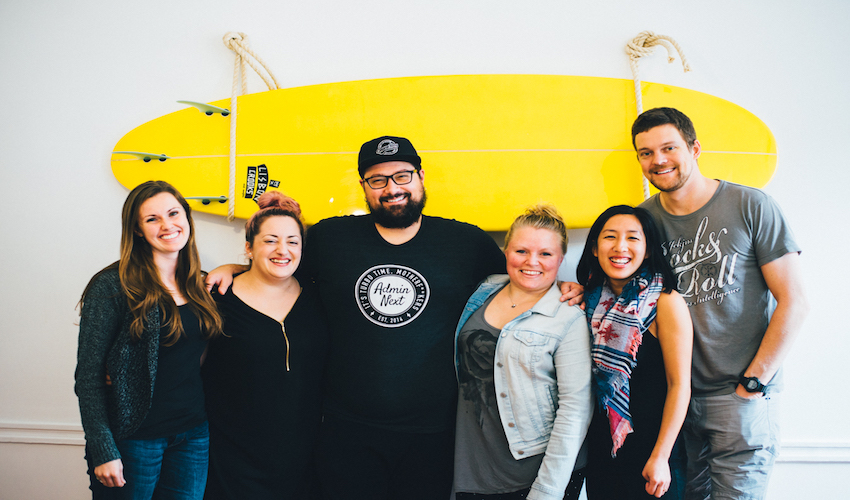
Pictured: Bringing a new atmosphere brings new ideas, according to Peter. (Peter Fabor/Surf Office)
Tiring of the humdrum while working as User Experience Designer for a Prague-based company, Peter was drawn to remote working, settling upon the welcoming climates of the Canary Islands as his base.
No longer were his days regimented by nine-to-five routine, but work was slipped effortlessly between mind-sweeping activities, which Peter says paved the way for clearer thoughts and more efficient working.
“Every day I used to go to surf or hiking and it was always easy to combine it with work because everything was in walking distance.”
Won over by his newfound work-life balance, Peter started to wonder whether the flexible lifestyle would appeal to others, providing an opportunity for likeminded ‘cool people’ who might otherwise be working alone to socialise and share ideas.
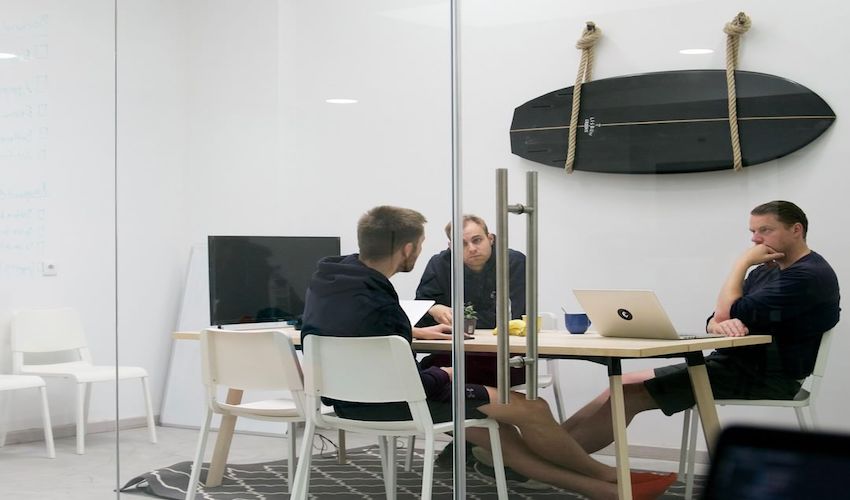
Pictured: One of the Surf Office locations. (Peter Fabor/Surf Office)
“I started to organise a small co-working space in the Canary Islands and people were coming to visit, stay there for a couple of weeks, and then this idea developed into company retreats and events… It was clear that there would be demand when I saw the first people coming and they were excited about it and they were sharing with other people, but I guess, as a business, I realised that it could work when we got the first big name company for a retreat.”
The company in question was the brains behind blogging platform WordPress, Automattic.
Despite having a 900-strong staff, the company is known for championing remote working – the ability to do one’s job from anywhere with an internet connection – which was documented and celebrated in a book called ‘The Year Without Pants: WordPress.com and the Future of Work.’
But even such trailblazers need a break – and an opportunity to meet in real life – which is where Surf Office stepped in with a Canary Islands retreat for ten US workers.
When things worked out, Peter says he remembers thinking: “Wow, this could actually be a business, not just a hobby.”
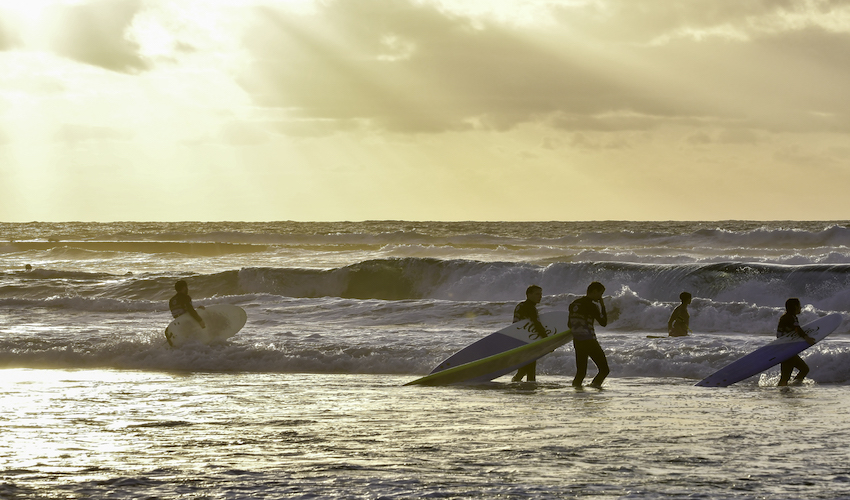
Pictured: As the name suggests, some of the retreats include surfing opportunities. (Peter Fabor/Surf Office)
While bringing digitally nomadic workers together in meet-ups is described as “our bread and butter” on the Surf Office website, Peter’s company has gone on to specialise in everything from milestone celebration getaways to team-building retreats aiming to “strengthen bonds” and “onboard new hires”, and strategy brainstorming sessions and innovation “hackathons” for 20 to 200 people.
Such has been the international demand, that in mere years the Surf Office has added eight more seaside hotspots to its ever-growing repertoire – all of which are tried and tested by Peter, ranging from Barcelona to Biarritz (where he caught his first wave) and even Santa Cruz in California – and four rural locations, including the awe-inspiring canyons of Utah’s Zion Park.
To understand why the idea has truly taken off with such vigour, one only need glance at Western productivity trends in recent years.
Defined as output-per-hour-worked per employee, productivity has been slumping in the UK since the financial crisis.
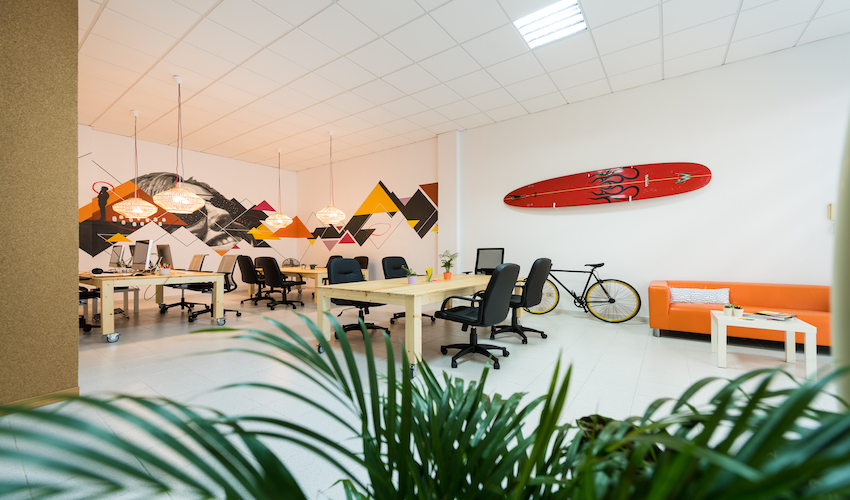
Pictured: Surf Office's motto is "Kill the routine". (Peter Fabor/Surf Office)
That’s not to say people aren’t working hard enough: if anything, it’s the opposite.
In the pressure cooker of the working world, a survey by GlassDoor found the average UK employee only uses around 75% of their annual leave – with young people particular offenders.
The finding is a symptom of ‘presenteeism’ – when employees come to work when they should really be indulging in self-care, rendering them unproductive – which a 2017 survey by insurer VitalityHealth revealed was behind around 30 working days being lost per employee per year in the national workforce.
Of course it’s no replacement for a genuine break, but the benefits of a hit of vitamin ‘sea’ and D absorbed in the course of a corporate retreat go without saying.
But the value of such getaways goes beyond giving employees a taste of that coveted holiday feeling.

Pictured: Beach-based activities in Jersey. (Peter Fabor/Surf Office)
Whether surfing or hiking, research shows that colleagues sharing challenging life experiences can boost morale and cohesion within the workforce, while heading out-of-office equals enhanced out-of-the-box thinking in brainstorming situations.
“It’s a clear win-win, because the employees are happy that the company appreciates them and organises this type of event.
“All these people, they usually have some larger goal and that goal can be preparing the strategy for the next year or brainstorming a new product… All these things are difficult to do in a regular office because you are busy with your day-to-day stuff. So, when you organise this type of retreat for a couple of days, you can achieve a lot of strategy work in very short time,” Peter expounds.

Pictured: Adventurous activities with colleagues can boost team morale, research shows. (Peter Fabor/Surf Office)
“For someone who never organised this type of event, it's difficult to realise. They think, 'Oh, if I organise this retreat with my employees, they are going to do the teambuilding activities and it's not much about the work, it's expensive.'
"When you talk to companies that have already organised this, they see a pure investment and return is very high, because you can achieve the things you cannot achieve in a regular office.”
But with a portfolio already stuffed full of show-stopping locations for such sessions, how did Jersey end up on the agenda?
“Over the years, the customer base in UK grew, especially in London, and we saw Jersey as an interesting location for start-ups, because… it sounds cool to go to Canary Islands or to go to Portugal, but if you organise a retreat for two or three days, you don't want to spend a lot of time travelling.

Pictured: Jersey is ideal for start-up retreats due to its connectivity, Peter says. (Peter Fabor/Surf Office)
“Jersey is an interesting location that you can fly there in 45 minutes from many places in UK, and you still have this experience of the isle life, you can surf, you escape the city,” Peter enthused.
Indeed, the island was recently named the top holiday spot for avid walkers in influential mag Condé Nast Traveller, while St. Brelade’s Bay was named the third best beach in all of Britain.
Thanks to an introduction from Jersey-based entrepreneur Toni Van Ejiden, the Surf Office ended up partnering with Digital Jersey, whose plush industrial-chic offices will provide the backdrop for retreaters’ meetings.
While the partnership was announced last autumn, Peter anticipates the trips to start taking place this summer – when Jersey’s ‘warmest place in the British Isles’ status can truly shine, alongside its famed ‘field to fork’ cuisine.
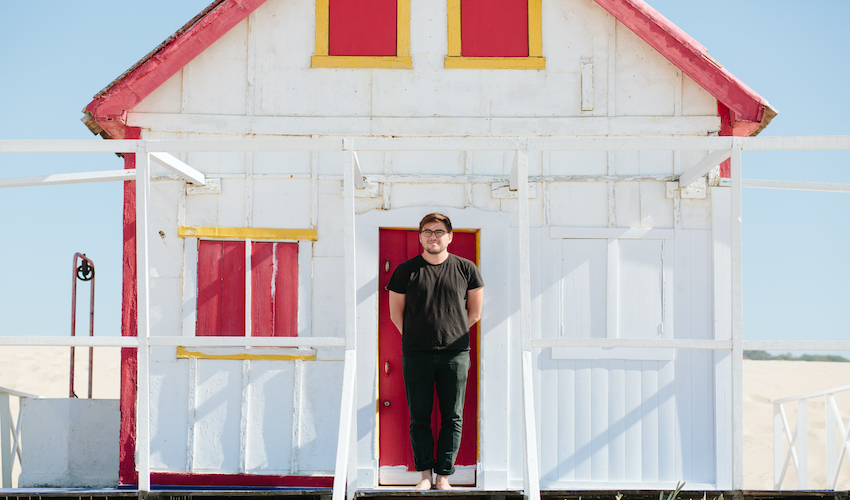
Pictured: Peter anticipates the trips to start taking place this summer. (Peter Fabor/Surf Office)
The partnership puts Jersey well ahead of the curve in the seizing the opportunities presented by ‘wellness tourism’, one of the key growth trends of 2020.
Indeed, the island will have already hosted its first breaks by the time the Farm Business Innovation Show – a calendar staple for rural entrepreneurs, which this year is focusing on off-the-beaten-track retreats – takes place in November.
Set against an increasing appetite for mindful activities to address work-life imbalance, the GWI estimates that the market for wellness facilities and experiences has been growing 6% yearly since 2016, and is now worth nearly £20bn.
Meanwhile, with kumbaya camp-outs and ‘trust falls’ left in the 90s and 00s, teambuilding is seeing resurgence, with UK companies now spending roughly £305 per employee on morale-boosting activities.
No wonder, then, that the ‘away-day’ industry’s value sits around £200m.

Pictured: St. Brelade’s Bay was recently named the third best beach in all of Britain. (Peter Fabor/Surf Office)
Uniting these two themes, therefore, could provide a lucrative opportunity for Jersey as the government is looking to diversify the economy, while Visit Jersey continues to push for one million annual visitors by 2020 in a bid to reinvigorate tourism, which underpins nearly 9% of the island’s jobs.
But Digital Jersey Policy Officer Audrey Lescot believes the benefits of The Surf Office will run deeper than a mere cash boost for the economy.
The Surf Office aims to nourish existing start-up communities in each of its locations by offering opportunities for meet-ups between the big players visiting and the micro-firms on the ground.
Audrey speaks enthusiastically of the cross-cultural expertise exchanges this could bring: “These people are coming from different companies so they have other mindsets and they are working on solutions that might be applied to the island… So that it can be really useful.”

Pictured: Corporate team building is seeing resurgence with new activities. (Peter Fabor/Surf Office)
Given that the majority of The Surf Office’s clients are tech companies, the partnership also presents the perfect opportunity to spread awareness of the island as what Digital Jersey describe as ‘The Perfect Sandbox’ – a location to “develop, test and launch new technology in a campus-like environment, without the high cost and complex legal, government and regulatory barriers often faced in other cities or markets”.
Even if only a short break, Audrey says she hopes the chance to rub shoulders with local innovators and experience the island’s impressive internet speeds – which were already listed among the fastest in the world, before being doubled to 500Mbit/s last month – will leave a lasting impression.
“‘We’ve previously had people saying, ‘I felt like home straight away in [the Digital Jersey Hub] because people started taking to me and gave me advice and we started collaborating.’
“…People also don’t realise that because Jersey is so small so when we talk to people in Europe and the UK and we tell them, “We have the fastest broadband speed” and they are like, ‘Oh wow, I had no idea! I couldn’t imagine!’"
Such start-up-friendly PR is invaluable at a time when Jersey is looking to build its international profile and identify new trade opportunities in the wake of Brexit.
And, if Peter’s predictions are correct, cementing such status for Jersey could be even more crucial.
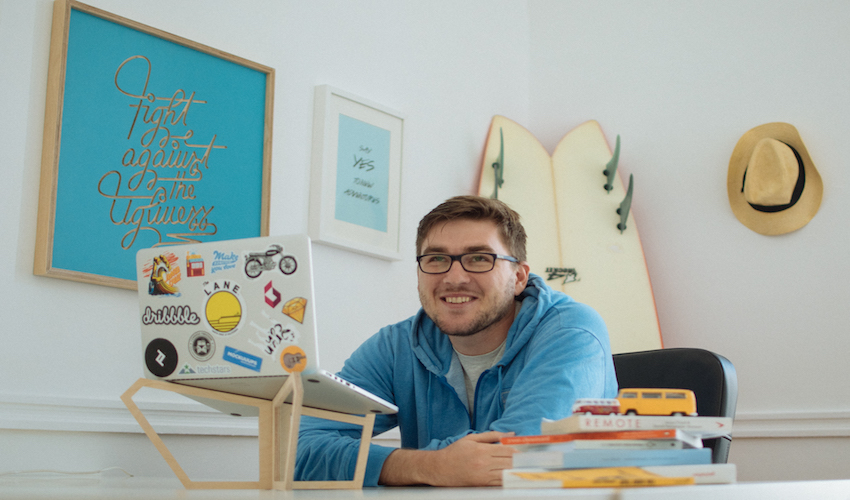
Pictured: Peter thinks start-ups will be based in small towns and villages for the lifestyle benefits in future. (Peter Fabor/Surf Office)
“With the growth of remote work, the importance of start-up hubs, like London or Paris or Berlin, in Europe, will decrease. When you have a company of a start-up, you can work from anywhere, why you would stay in such an expensive city?...
“I believe that, in the future, we will see more and more start-ups having offices in small towns or even the fisherman villages, because you have a great lifestyle, you have great weather, it's much cheaper, and to fly from [there] back to London for a meeting is actually not a big deal.”
Surf’s up.
This article first appeared in Connect Magazine, which you can read by clicking HERE.
Comments
Comments on this story express the views of the commentator only, not Bailiwick Publishing. We are unable to guarantee the accuracy of any of those comments.